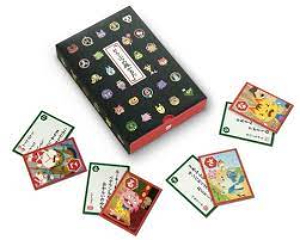Karuta

| |
| Karuta | |
| Designer | various |
|---|---|
| Manufacturer | various |
| Released | 17th century - present |
| Added to Museum |
Animal Forest: November 25, 2019 |
Karuta (かるた), named after the Portuguese "carta", are playing cards that originated in Japan in the 17th century. They have their distinctive image-based design due to the ban on Western-style playing cards instituted by Japan in that era.
History
In 1549, missionary Francis Xavier landed in Japan and the crew of his ship had carried a set of 48 Portuguese Hombre playing cards from Europe. The cards became popular in Japan, however after the country banned contact with the West in 1633, Western-style playing cards were banned as well.
A number of playing cards were developed in Japan to try to circumvent the ban, and games emphasizing images instead of numbers were developed to get around Japanese anti-gambling laws.
By the late 19th century, laws against image-based cards were relaxed, as their potential use in gambling was seen to be lessened due to a lack of an obvious numbering system that was present in Western-style cards.
Nintendo
Nintendo Koppai (任天堂骨牌, "Nintendo Cards"), was founded by Fusajiro Yamauchi on September 3, 1889, following the relaxation of laws against playing cards in Japan. The company was founded in Kyoto, in an area that was well known for Yakuza activity. Yamauchi used this to his advantage, originally producing handmade Hanafuda playing cards. Nintendo's Hanafuda cards soon began to be used in Yakuza gambling parlors.
When demand began to overwhelm his ability to produce the handmade cards on his own, Yamauchi hired a small team to help him create the cards. His cards had become so popular that by the early 20th century, he opened up another card shop in Osaka, Japan, selling Hanafuda and other karuta.
Karuta in video games
Card games using Karuta decks have remained popular in Japan and have appeared in several video games.
Iroha Karuta
Iroha Karuta (いろは かるた, "syllabary order cards"), a popular game using karuta, involves dealing cards and reacting quickly to spot pairs of cards.
It has been included in video games including Like a Dragon Kenzan! on PlayStation 3.